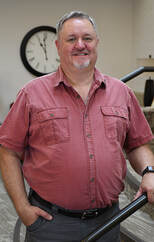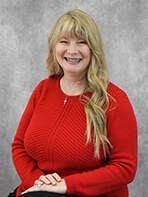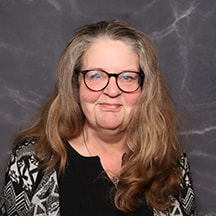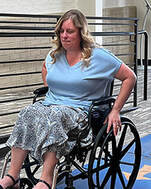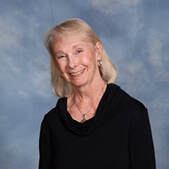because I had seen the Rankin-Bass cartoon adaptation of The Hobbit a few months earlier. This was the first book I had ever read.
I’m sure it was still the early part of ’78, still winter, because we had not moved to Washington yet. Certainly, it was Neil Church, our music pastor, who recommended The Chronicles of Narnia to me; and thank God he did! I recall coveting a UK published set he had in his office at the church. It was closer to my actual reading level, and, therefore, much more appropriate. I had a more recent US set, and I read these books over and over (probably over 30 times) from then through the ‘80s. There was something in them that spoke to my soul, and it offered me an escape of sorts from life in a world I didn’t feel a part of. But this recollection was from when I think I was in the fifth grade, late in the school year… so 1979 when I was eleven years old. I was at the top of the long driveway, right before the decline started. I was unhappy, lonely, and found myself standing there, praying that God would give me a passage into Narnia, or someplace like it. My teacher that year, for whatever reason he had, suggested that I see a mental health professional (though I’m sure he said “shrink”). Not because of the Narnia thing, nobody knew that. I was almost entirely disconnected in the classroom, only occasionally speaking up, correcting the teacher on a mistake and getting myself in trouble. I saw a psychiatrist in downtown Seattle who got me talking a lot! I don’t remember any of the topics, but I do remember the IQ test. (And I remember seeing a capuchin monkey in a car on the freeway on the way home one day.) A few years would pass before I found out what the doctor had determined about me, but the following school year, my sisters and I found ourselves in a small private school. At the start of sixth grade, I tested at a second-grade reading level. By the end of the year, I was at seventh-grade. Unfortunately, the prime years for learning the core of mathematics had passed. However, I became a voracious reader, and C.S. Lewis was my favorite author. I had read Mere Christianity and The Problem of Pain before I turned 14. I always had two books going: one for home reading, and one I carried when we went out. At home, it was almost always Narnia. Outside, I read Edgar Rice Burroughs, JRR Tolkien, Edgar Allan Poe, various Star Trek novels, and anything else that came my way. At least once a week, I walked down to 7-11 and also picked up a couple comic books. In 1982, the private school closed and my parents contacted the school in Texas that had provided their curriculum, arranging for my younger sister and I to do school at home. In 1983, just as my first year of home-school was ending, my family started attending a new church. On the first Sunday there, I met Gavin Anderson. It was also his first time there, and we were immediately best friends. Shortly thereafter, I was supposed to write a short story for an English class. I don’t think I’d written a story since fourth grade. The result was chock-full of the things I felt inside. It started, “There was nothing special about Steven Collier, and people made him feel that way.” It ended with him discovering a varve that was the portal to another world. He stood there, at the exit of the magical caverns, facing a sylvan scene and two moons in the distant night sky. In the summer of 1984, Gavin and I spent a month together working at Lakeside Bible Camp on Whidbey Island. We washed dishes, set tables, did general custodial duties… and on a couple of occasions we snuck out of the cabin at night and took a canoe out onto the lake. We sat in the canoe for what must have been hours talking about the things that were of interest to us and (we believed) to no other teenager in the ‘80s. After speculating on what Tolkien might have written further on his world of Middle Earth, I told him about my short story. He asked, “Well, what happens next?” This was the seed of the story I’d write about Steven Collier in a world of elves, dwarves, and dragons. To date, it’s easily the longest thing I’ve ever written. Over the next years, it was the vehicle through which I experimented with writing. It’s really not good, and I’m sure will never see print, but it holds a place in my heart. Writing became the door that God gave me into my own personal Narnia. In Christ, Mikal Johnson
5 Comments
the cross. In your mercy forgive us, heal us, and make us whole. Set us free from our sin and restore us to your joy.”
Personal confession makes me nervous. I think we are all pretty clear on the deadly sins. It’s a humbling search into my thoughts and my heart that convicts me. To God, all hearts are open, all desires are known, and there are no hidden secrets. He knows all about me and my flaws. Thankfully, he loves me just as I am and only wants what is best in my life. It is impossible to pray powerful prayers when there is unconfessed sin between me and God. How often do my prayers have less power because I fail to practice meaningful confession on a daily basis? Psalm 66:18 warns that God will not hear me when I harbor sin in my heart. In 2 Corinthians 10:5, we are told to take every thought captive to the obedience of Christ. When I search my heart, I come up with these thoughts and behaviors that are sinful: being consumed with earthly pursuits, bitterness, fear, and doubt. Attitudes of comparison, prejudice, pride, and feeling lukewarm towards God. My critical, unkind, or unloving words; exaggerating my stories; speaking about others when they are not present. And how about this one: speaking, when I should be quiet? When I am honest with God, He will reveal areas in my heart that he wants to refine. I must not be afraid to own up to my sins. God‘s grace is sufficient. 1 John 1:9 says when we confess our sins he is faithful, and just to forgive us our sins, and cleanse us from all of righteousness. Our God is so wonderfully patient and gracious. He will meet us right where we are and lovingly guide us to deeper levels of prayer after our confessions. In His Name, Heather
Our latest evening was spent with people whose lives were impacted at an early age by diseases that left them paralyzed, as well as the mother of a paraplegic daughter and a son with autism, who started a bakery that employs those with enhanced needs. Their stories were inspiring and thought provoking. At the end of the night, those who wished to have a lived experience attempted to navigate a course filled with barriers that those in wheelchairs face daily. A few comments from those who attended: As we continue to practice Love First, we hope that you will join us in August as we explore the complicated issue of homelessness. MATTHEW 5:16 "In the same way, let your light shine before others, that they may see your good deeds and glorify your Father in heaven.” In His Name, Donna
was going on in the world; and his aspiration was to help change things for the better. Eventually, he was successful in that regard by serving in political office. I personally was never very interested in what they were talking about. I think that was because I was 6 years younger than my brother and I was focused on taking ballet lessons! Important stuff like the 4th of July, however, was different. All families have traditions. There are things that families do every year, people they remember, or dates they commemorate. In our family on the 4th of July, we set off fireworks just like everybody else. But the important tradition we had on this date was to read the Declaration of Independence together and really spend time reflecting on this amazing document and how it paved the way to freedom for our country. The Rights that it spelled out, that we are entitled to, have not changed. Despite many changes in our world, our desire for Freedom remains. I believe that the most important thing to understand as Christians is the message that the document provides. My favorite (and probably the most famous) passage is, “We hold these truths to be self-evident, that all men are created equal, that they are endowed by their Creator with certain inalienable Rights, that among these are Life, Liberty and the pursuit of Happiness.” The authors of this document clearly were men of faith. I believe that they acknowledged the existence of God as our Creator, but primarily they were talking about personal independence. This would be the ability to make our own decisions and choose our own path in life. But there is a different type of freedom: the type that Christ offers us. This freedom is not contained in a document written by man. This is not a freedom that we have had to earn. We do not receive it by doing good works or by staying busy doing what we think is right. It is, however, the most important type of freedom. I am, of course, speaking of spiritual freedom. We can only attain this by truly accepting God as our Savior and by following His teachings. When Jesus came to earth to walk among us, He said that He had come to proclaim freedom. (Luke 4:18) He also said, “If the Son sets you free, you will be free indeed.” (John 8:36) He was not setting us free to do whatever we wanted to. He was liberating us to walk in relationship with God and to be the type of people He created us to be. He gave us the ability to obey God and to choose His will for our lives. So my hope for you would be to allow yourself to commit to the will of God, for this is the only sure way to find peace and to be truly free.
In His name,
Ellen |
What's UpOur staff is voluntold each week and with grace they share their thoughts. Archives
July 2024
|

